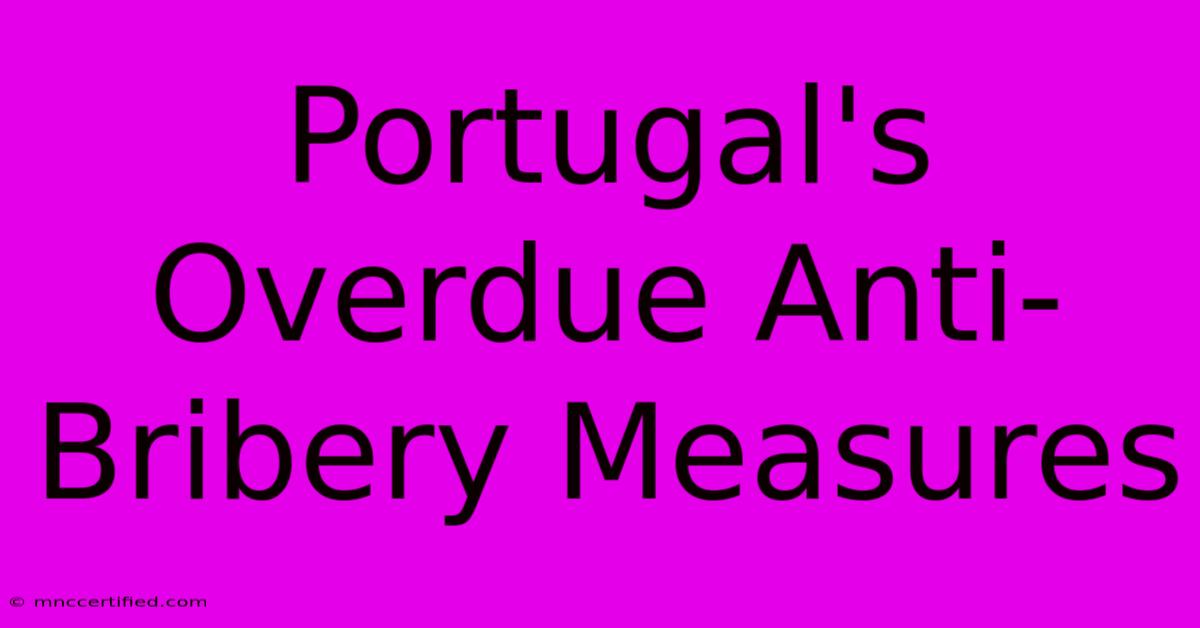Portugal's Overdue Anti-Bribery Measures

Table of Contents
Portugal's Overdue Anti-Bribery Measures: A Necessary Step Towards Transparency
Portugal, a nation lauded for its sun-drenched beaches and rich history, has faced persistent challenges in tackling corruption. While strides have been made, the implementation of robust anti-bribery measures remains an ongoing struggle, prompting calls for significant reform. This article delves into the current state of anti-bribery efforts in Portugal, exploring the existing legal framework, its shortcomings, and the crucial steps needed to foster a more transparent and accountable society.
The Current Legal Landscape: A Foundation with Cracks
Portugal boasts a legal framework ostensibly designed to combat bribery. The Criminal Code criminalizes bribery of both domestic and foreign public officials, alongside private sector bribery. Further, Portugal has ratified the OECD Convention on Combating Bribery of Foreign Public Officials in International Business Transactions, a significant commitment to international anti-corruption standards. However, the effectiveness of these legal provisions has been repeatedly questioned.
Challenges and Shortcomings
Despite the existence of these laws, several key shortcomings hinder their effectiveness:
-
Weak Enforcement: A persistent criticism is the lack of vigorous enforcement of existing anti-bribery laws. Investigations are often slow, and convictions are relatively rare. This lack of accountability undermines the deterrent effect of the legislation. Increased funding and resources for investigative bodies are crucial to address this issue.
-
Limited Whistleblower Protection: While Portugal has introduced whistleblower protection mechanisms, these are often insufficient to encourage individuals to report instances of bribery without fear of retaliation. Strengthening these protections is essential to incentivize reporting and uncover hidden corruption networks.
-
Transparency Deficiencies: Lack of transparency in public procurement processes and a general lack of accessible information about government spending create fertile ground for corruption. Enhanced transparency initiatives, such as open data portals and stricter public procurement regulations, are necessary to curb this problem.
-
Inadequate Corporate Liability: The current framework doesn't adequately address corporate liability for bribery, allowing companies to escape accountability for the actions of their employees. Implementing stricter corporate liability laws would force companies to adopt robust anti-bribery compliance programs.
The Path Forward: Essential Reforms for a Brighter Future
Addressing Portugal's anti-bribery shortcomings requires a multifaceted approach encompassing legislative reforms, strengthened enforcement, and a cultural shift towards greater transparency and accountability.
Key Recommendations for Reform:
-
Strengthening Enforcement Capabilities: This involves increased funding, improved training for investigators and prosecutors, and a streamlined investigative process to ensure swift and effective prosecution of bribery cases. Collaboration with international anti-corruption agencies could enhance expertise and capacity building.
-
Robust Whistleblower Protection: Implementing comprehensive whistleblower protection legislation that guarantees anonymity, protection against retaliation, and appropriate rewards for reporting corrupt activities is crucial. This should be accompanied by public awareness campaigns to encourage reporting.
-
Enhanced Transparency and Public Access to Information: This includes implementing open data initiatives, streamlining public procurement processes, and ensuring public access to government records. Independent audits of public spending would further improve transparency and accountability.
-
Strengthening Corporate Liability: Introducing stricter corporate liability laws, including provisions for fines and sanctions proportional to the severity of the offense, is essential to deter corporate bribery. This should also include promoting the adoption of robust anti-bribery compliance programs within companies.
-
Promoting a Culture of Ethics and Integrity: Education and awareness campaigns targeting both the public and private sectors are vital to fostering a culture of integrity and ethics. This includes promoting ethical values in schools and workplaces and encouraging ethical conduct among public officials.
Conclusion: A Long Road Ahead
Portugal's fight against bribery requires sustained commitment and a comprehensive approach. While the existing legal framework provides a foundation, its effectiveness hinges on stronger enforcement, improved transparency, and robust mechanisms for accountability. By implementing the recommendations outlined above, Portugal can move towards a more transparent and corruption-free society, ultimately fostering economic growth and strengthening public trust. The success of these measures will be crucial not only for Portugal's domestic stability but also for its international standing and attractiveness to foreign investment.

Thank you for visiting our website wich cover about Portugal's Overdue Anti-Bribery Measures. We hope the information provided has been useful to you. Feel free to contact us if you have any questions or need further assistance. See you next time and dont miss to bookmark.
Featured Posts
-
Watch Portugal Vs Uefa Nations League Livestream
Nov 16, 2024
-
Jazz Top Mavericks On Collins Final Dunk
Nov 16, 2024
-
Landman Review Sheridans Decent Western
Nov 16, 2024
-
Tyson Vs Paul Date Time Odds How To Watch
Nov 16, 2024
-
Pam Price Insurance Jena Louisiana
Nov 16, 2024